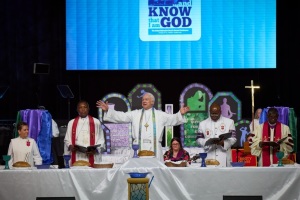Sojourners Magazine Walks a Fine Line With Gay Advocacy Ad
Sojourners magazine appears to be walking a fine line with an ad about homosexual homelessness in its September/October issue. The organization hopes to encourage Christians to champion the plight of battered homosexual youths while maintaining a conservative stance on sexuality, but other evangelicals find the ad tasteless and immoral. The campaign features a child holding a teddy bear.
Sojourners spokesman Tim King said he hopes its new ad, sponsored by the Gay & Lesbian Alliance Against Defamation (GLAAD) and the Ali Forney Center, will encourage Christians to reconsider not only how they view homelessness, but also homosexual children.
"I can say I have heard story after story of young people who were kicked out of their homes or faced abuse at the hands of parents or foster parents because of their sexuality," said King, who has worked with homeless youths for three years. "The church should be the first place to step up and say, 'Don't kick a kid out onto the streets because they are talking about or questioning or trying to understand their own sexuality.'"
The ad features a young boy sitting on a railroad track with a teddy bear and a suitcase close by. An adult male, presumably the boy's father, is walking away. Near the bottom of the picture are the statistics about homelessness among lesbian, gay, bisexual and transgender youth.
The poster may appear to be a ringing endorsement for normalizing homosexuality in the Christian faith. However, King is quick to clarify, "It's important for congregations to work out their theological concerns in a healthy way for those churches and denominations. To do that is outside the scope of Sojourners."
The ad combined with some editorials about the plight of homosexual youth has seemingly satisfied GLAAD. However, the magazine's refusal to boldly take a progressive position on homosexuality has upset other groups.
Dr. Michael Brown, host of the radio show, “In the Line of Fire” and author of A Queer Thing Happened to American, feels Sojourners is doing a disservice to its readers if its intent is to stimulate discussion about childhood struggles.
“First of all, GLAAD should be called the Gay & Lesbian Alliance Against Disagreement,” said Brown. “They are dead-set against hearing any discussion that does not agree with or promotes their agenda. They are the same group that petitions CNN and others not to allow an opposing view to be aired about a pro-homosexual story."
Joseph Ward III, the director of communications for the New York based non-governmental organization Intersections International takes another view. He suggests that while the GLAAD ad is a positive sign, Sojourners must advocate LGBT inclusion in the church in order to make real change.
Ward wrote the disapproving editorial after Sojourners refused to run a video advertisement from Intersection International's Believe Out Loud campaign. The ad for the LGBT church welcoming campaign showed a boy and his lesbian parents being welcomed into a mainstream Protestant church.
King featured the video in Sojourner's blog and wrote that Christians should welcome dialogue from those with differing views as part of the church's call to love thy neighbor.
However, Jim Wallis, the magazine's CEO and editor-in-chief, reasoned, "It is our hope that differing viewpoints are not silenced, but are lifted up in a display of Christian, and often interfaith, sisterhood and brotherhood. It is for this reason that we ... typically do not display advertising relating to issues amongst people of faith that have unfortunately, and too often, been reduced to political wedge issues."
Self-identified conservative Protestant Matthew Lee Anderson has supported Wallis’s position.
Anderson, who writes a blog entitled "Mere Orthodoxy," defended Wallis saying that he has been upfront about his belief that marriage should not be redefined.
Wallis told Christianity Today in 2008, "I don't think the sacrament of marriage should be changed. Some people say that Jesus didn't talk about homosexuality, and that's technically true. But marriage is all through the Bible, and it's not gender-neutral."
Wallis, however, takes a progressive stance on poverty equating it with slavery in the same 2008 interview.
Anderson notes that it is becoming increasingly difficult for even the liberal Christian to hold progressive stances on some issues while preserving conservative stance on sexuality.
"It's not enough (anymore) to be liberal on economic or racial issues and conservative on the sexual ones, as sexual politics have taken precedence over any others in the religious left," he wrote in May.
Anderson, like King, believes that Christians are called to care for the homeless no matter their sexuality.
"We speak out precisely because they are fully humans, made in the image of God, and who are meant to be welcome within the unconditional love of the family – regardless of their sexual orientation," he shared.
However, he warns that Christians must express this belief with caution.
"When speaking against the homelessness of young people who are at risk because of their sexual orientation, Christians must do so on grounds that do not rest upon and reinforce the problematic presuppositions that sometimes stand beneath the advocacy work," Anderson cautioned.
Those problematic presuppositions would include any belief that the Bible, God, His son Jesus or the Christian Church sanction either homosexuality or gay marriage.
King says he believes that Christians can stand up for the rights and protections of homosexual men, women and teens without compromising the Bible.
"I don't think there is any contradiction with the Bible to say people deserve equal protection under the law. I think that is very consistent with our understanding of each individual being created in the image of God."
But Anderson stated, "The reaction to Wallis' decision [not to run the Believe Out Loud video ad] suggests that the time is coming when folks like him and Ron Sider, who want to stop their progressivism at the line of gay relations and marriage, will find themselves in just as odd a position as those who are conservative economically but liberal on sexual politics."
Brown was also concerned that an advertisement advocating homosexuality includes a small child.
“The only issues a small child may be struggling with that involve homosexuality are most likely because of things they have seen on TV or been exposed to by GLADD approved Hollywood scripts. I am disappointed they are using children to try and further their agenda."





























